#the beauty of books is in the inner musings of characters and you can't really portray it that well on film
Text
.
#just had a random thought this morning about acotar#where will it air? pornhub?#like...#i like the books; i really wish i could read the rest (sjm needs to fkn hurry up writing them)#but do i really need another televised book#the beauty of books is in the inner musings of characters and you can't really portray it that well on film#unless like it's about sjm's entire opus so there's so much happening; you don't really care about the characters' thoughts#nvm me; i'm salty i can't start reading crescent city because i need the acotar series to be finished first#but i also need to know how they're all interconnected along with throne of glass
0 notes
Text
thoughts on holly black's tithe
fair warning that this isn't really going to be a book review—I went into this book predisposed to enjoying it, and I generally had a good time. rather than a comprehensive review, I just have some loose silos of thoughts I wanted to share. it's still a long post, but I'm not attempting to cover everything! so without further ado (some spoilers ahead):
let's get this out of the way
Tithe was Holly Black's debut YA novel, and it reads like it. it's a good debut—she's clearly a skillful author even this early in her career—but there are some choices (pacing, phrasing, etc) that read as slightly amateur. one of these choices was, in my opinion, including multiple POVs. maybe this is a controversial take, but I would've enjoyed this book more if Roiben's POV hadn't been included. it would've increased narrative tension, led to more intrigue about his character, and allowed us to get to know him along with Kaye (rather than being privy to his secrets and Deep Inner Turmoil from the jump).
I can't remember where I saw this, but someone said that reading Tithe feels like talking to a teen who's just figured out they can swear & make sex jokes, and yeah, that's accurate—but I also found it strangely endearing. Kaye is a teen, and her ~quirky~ teenager-ish musings on boys, alcohol, fashion, etc feel believable. which leads, unfortunately, to the next thing I've gotta address:
Kaye is 16 years old, and most of the time, she reads like a 16 year old. on the other hand, we're never told Roiben's exact age, but the man has lived a lot of life by the time we meet him. now I'm pretty lenient toward the idea that the Folk age differently than humans, so it's not really an exact number that's the issue, but the sheer chasm in life experience between them. I quite enjoyed both characters on their own, and conceptually, I feel like they work well together on a personality level, but yikes guys. the story even highlights that Kaye hasn't gotten her license yet because of her age; meanwhile, Roiben is waxing melodramatic about how many people he's killed in his years of tortured servitude to his evil queen. this age gap combined with the insta-lovey nature of their relationship* made this book feel... well, about as dated as it is.
*they have great chemistry once they're actually having conversations & getting to know one another! I really enjoyed their banter! but that's well into the book, and well after they've already been acting mutually infatuated
laughs nervously while looking at sjm
okay I'm not going to harp on the above points, I just wanted to get them out of the way. but now let's play a game: let me tell you about a plot from a popular YA novel, and you tell me which book I'm describing.
there is an evil queen with beautiful red hair and pale skin. she holds her court beneath a large hill. the court itself is ghastly—full of bloodshed, debauchery, riddles, and cruel games. unfortunately, an immortal fey man has found himself magically bound to her power, and while he tries to carve out pockets of agency in minor ways, his forced loyalty to his queen requires him to compromise his morals and cultivate a fearsome, bloody reputation.
a young woman who was raised in the human world finds herself swept up in the machinations of this court. the man fears for her, because she is vulnerable, but her presence also makes him feel hope, and her strength and cleverness surprise him. many shenanigans ensue, and they kill the wicked queen.
I mean. there are notable differences, of course, but I just noticed too many acotar parallels. anyways. holly black did it better
reading a faerie's pov
I've already established that I love Kaye, but guys, I really do love Kaye. I love that she takes initiative and moves the plot along (breaking her glamour too early is a great example of this—she could've gone along with the Grand Plan, but her curiosity led her to act faster). I like that Holly allows her to be selfish and think ugly things, but still try to do good and be kind. I know these books have less buzz than tfota, but I find myself fascinated that there's not really Discourse about the Kenny situation (for a tldr: Kenny is Kaye's best friend's boyfriend. Kaye accidentally glamours him to be infatuated with her. when she learns how to remove that glamour, she first takes the time to taunt him publicly and humiliate him with his own desire for her. personally, I like that Holly wrote her doing this and then feeling remorse about it, but it is objectively pretty shitty, both to him and to her best friend).
I also like the way Kaye is believably fey. she's playful and blunt and mostly uncaring about social conventions. repeatedly throughout the book, she'll make a decision without deliberating on it beforehand (which at first, as a reader, feels jarring), but then as she's facing the consequences, she processes her choice and often feels regret or course-corrects in some way. it feels very fae to jump into something because it seems fun, then only once you're in the thick of it realize that Oops, My Actions Have Consequences
threads left undone/questions that weren't answered—or maybe I'm a bad reader
who tried to kill Roiben at the beginning of the book? it's a Seelie arrow, but I thought there would be more plot relevance to this attempt on his life. do Seelie fae often try to murder him? it seemed like a significant one-off event, but as it stands at the end of Tithe, it was just the narrative's way of leading Kaye to find him
Kaye pricked her finger on a thorn in Lloyd's jacket pocket, and I now understand that this was (I guess?) meant to connect Lloyd to Nephamael (the knight with the thorn-lined cloak). but hey, this is a magic book, and I really thought there would be some magical significance to Kaye pricking her finger
is Kaye Fierch her true name? Does she have a true name that she's unaware of? How are true names given / received?
what secrets are guarded by the Court of Termites?? I know this isn't really a plot hole because Kaye is so new to the world of the Folk, but I'm just putting it on the record right here that I really hope we learn some of these Deep and Dark Secrets that were teased
because this post has gotten long, I'm going to create a separate one with bullet points of things we learn about/are reminded of re: how the faerie world works. I kept track of these for the fic I'm currently outlining, but also because it's fun to pay attention to little worldbuilding details :)
#reading the modern faerie tales#reading tithe#tithe#holly black#modern faerie tales#kaye fierch#rath roiben rye#tfota#the folk of the air#kaye x roiben#bookish blabs
40 notes
·
View notes
Text
Idle musings of a sour note:
Tumblr has a strange culture. I've enjoyed a lot of stories in my time... Yet, to come onto tumblr and find other people discussing them.... disgusting them...
"Other people", of course. I could play some grim, ugly refrain, giving names to this-and-that...
"I name you... ugly-monkey-butt! ......and I name you.... Poopoo Papa!"
lol.
So, "fandoms" (fan-kingdoms) can build around a story. They may develop their own "fanon" (fan-canon; i.e. things that do not actually happen in the story, but which are memetically-propagated within the culture of the fandom.)
So how do these fandoms propagate?
I feel that a big 'factor' is in people who have not actually read the Original story... or perhaps they "found out about the story through the influence of fandom", and so they may have been primed by the fanonical lense applied to it -- to already react to the events in the story a certain way.
This is why I cherish those stories that I read in the times before I founded a blog. I didn't 'instantly-react', I didn't update my blog to say: "HOLY SHIT GUYS! THIS IS CRAZY!"
It was me with my nose in the book, immersed in an intercourse with the characters of the story.
Now, are there interesting stories inspired by other stories? Yes, of course. Many authors have been inspired by art.
There is a difference in ecosystem between a "fan-collective", and a singular fan, and a small group of friends who discuss something together.
I get a very 'oppressive sense' from tumblr, and I always have, since I discovered it. Yet, there is also boundless creativity to be found on the world wide web... so what will I do?

i feel a good balance of nice energy & rude energy cioming through the monitor at me, and i think i will stay online for about 3 more hours.
--- wint@dril
fucking lab rats drinking morphine-laced water when they're kept alone, and preferring normal water when they're socially-engaged. (both sets of rats have a choice of drink)
....but can't anything have a 'fanonical lense', so to speak?
Such as... trying to interpret the results of a scientific experiment. Just like what I just said... the way I phrased it. How I related it to my own set of experiences... that's all... so...
human.
I think I have a deep antipathy for ....something. I thought "the human race", but then I recoiled from that. Its more about the 'cultures' of people. Sick, empty, impoverished of meaning. Is this all a result of "the greater system at work"? Don't people have a choice in where their own lives go?
Yes, well, at the same time.... the product ends up very ugly if you try to force people to change.
Even if they acqueisce, agree, follow you enthusiastically... it just is not natural. Believe me, I've tried. I learned my lesson. Even myself: I guillessly followed a few self-assured idiots, and only through realizing that my "new output" had become irredeemably ugly, did I ever put it down. Who cares about heartless, intellectual arguments, in the face of beauty?
Beauty is intellect that becomes integrated into the sense world. It's deeper...
Simplicity.
In the theoretical realm, I sound really mean. -- like I'm just 'berating fans for no reason'. but if I showed an example.... hm, well what inspired me to write this?
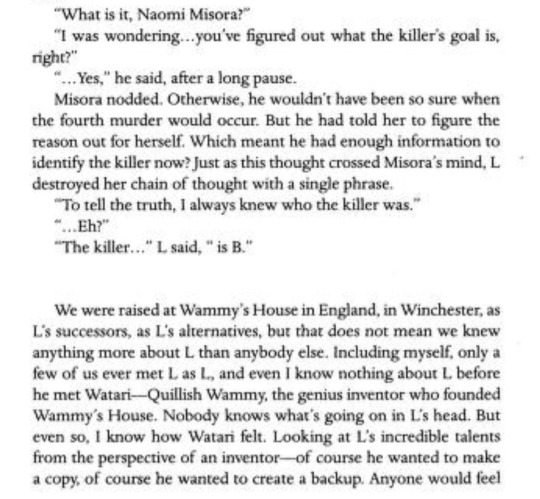
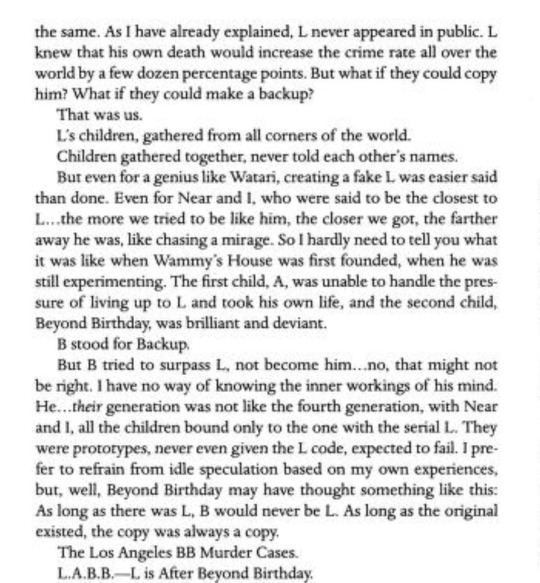
continue reading...
A few people have written offshoot stories where the child B had loved the child A, and mourned their death. This became a popular 'fanon': that idea of a motive for revenge against L.
....but, I find that so.... saccharine.... cloying. Stupid.
Perhaps that feeling stems from my own detachment from social bonds, wherefore I........
Well, actually...
My question is:
"Do you think you can replace Madness?"
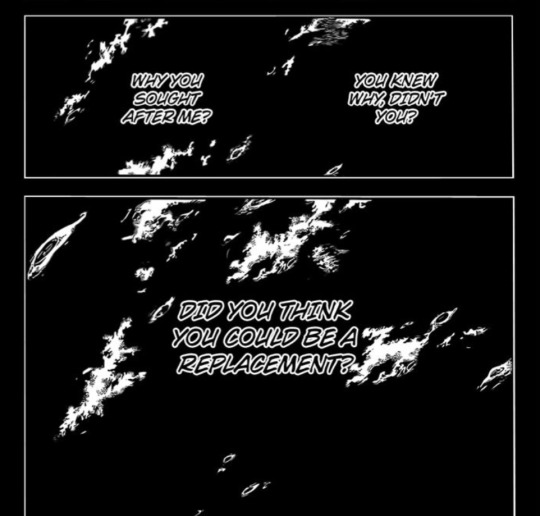
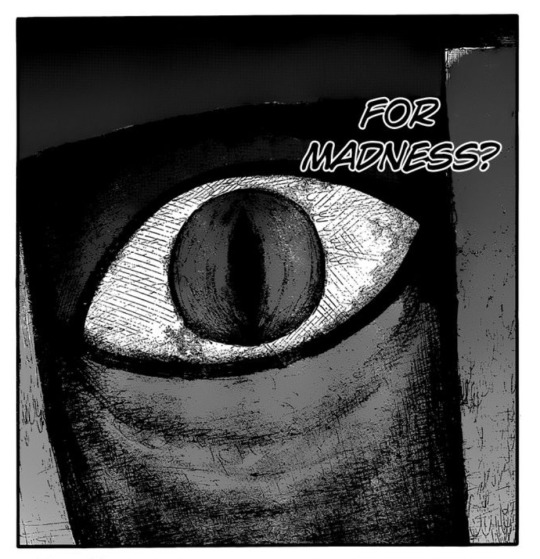
As I see it, Grief is an exhaustible motive. Eventually you will get sick, and sick of paring yourself down and down to fit into the box of the "Victim", the "Underdog who is supposed to overtake the Suppressor".
what if you were doing things just to see what happened?
what if life was an experiment?
as yelyahnaloj said today, it's good to think of an experiment as telling a story. it cannot be separate from the context within which it took. At least... not without sacrificing data.
So maybe this child was inspired by what he saw going on around in life.
I think that human relations can be much more complex than simply "love" or "hate", or shades in-between. After all, we have Sadism and Masochism, which seem to light up both centers at once.
...feeling for another person can be "layered". Perhaps the ones "on top", (i.e. conscious) are not Falsities.... Are there rules to human cognition?
Who is to say I haven't loved someone who I also hated so, so much. I was glad when he died, even though I love him. I still love him. People are more than paper.
Perhaps "fandom" can seem strangely neutered. After all, a blogger may want to "portray a good face". So-called "social-justice culture" is endemic to this website...
Actually, no, I think it's just a welcoming host. From what I heard, SJWism (and the annoying, cloying attitudes) may have originated (in their recent forms)... on the Something Awful webforums.
I think vanity is ugly.
I relate very much to Czesław Miłosz's profile of Beta:
"When I met Beta in 1942, he was twenty years old. He was a lively boy with black, intelligent eyes. The palms of his hands perspired, and there was that exaggerated shyness in his behavior that usually bespeaks immense ambition. Behind his words one felt a mixture of arrogance and humility. In conversation he seemed inwardly convinced of his own superiority; he attacked ferociously yet retreated immediately, bashfully hiding his claws. His ripostes were full of pent-up irony. Probably, though, these characteristics were most pronounced when he spoke with me or with other writers older than he. As a beginning poet, he felt he owed them a certain respect, but actually he believed they were none too deserving of it. He knew better; in him lay the promise of a truly great writer.
In 1942 in Warsaw, we were living without hope, or rather on a hope we knew to be a delusion. The empire which had absorbed our country was so mighty that only an incorrigible optimist could believe in the possibility of a totally vanquished Germany. Nazi plans in regard to our nation were perfectly clear: to exterminate the educated class, to colonize, and to deport a segment of the population to the East.
Beta was one of the young people who started writing during the War, in the language of slaves. He supported himself by various odd jobs. It is hard to define exactly how people earn a living in a city completely outside the law. Usually they took half-fictitious posts in an office or factory that supplied them with a work-card plus the opportunity to operate a black market or to steal, which was not regarded as immoral because it injured the Germans. At the same time, he studied in the underground university and shared the exuberant life of the resistance youth. He went to meetings where he and the other young people drank vodka, argued heatedly about literature and politics, and read illegal publications.
But he smiled scornfully at his comrades; he saw things more clearly than they. He found their patriotic zeal for battle against the Germans a purely irrational reflex. Battle-yes, but in the name of what? None of these young people believed any longer in democracy. Most of the countries of Eastern Europe had been semi-dictatorships before the War; and the parliamentary system seemed to belong to a dead era. There was no question as to how one came into power; whoever wanted to take over authority had only to seize it by force, or else create a "movement" to exert pressure on the government for admittance into a coalition. This was an age of nationalist "movements," and Warsaw youth was still very much under their influence even though, obviously, it had no sympathy for either Hitler or Mussolini. Its reasoning was confused. The Polish nation was oppressed by the Germans; so, one had to fight. When Beta declared that they were merely countering German nationalism with Polish nationalism, his comrades shrugged their shoulders. When he asked what values they wanted to defend or on what principles Europe was to be built in the future, he got no reply.
Here indeed was a well of darkness: no hope of liberation, and no vision of tomorrow. A battle for battle's sake. A return to the pre-war status quo, bad though it had been, was to be the reward for those who might live to see the victory of the Anglo-Saxons. This lack of any sort of vision led him to see the world as a place in which nothing existed outside of naked force. It was a world of decline and fall. And the liberals of the older generation, mouthing nineteenth-century phrases about respect for man-while all about them hundreds of thousands of people were being massacred-were fossil remains.
Beta had no faith, religious or other, and he had the courage to admit it in his poems. He ran off his first volume of verse on a mimeograph machine. No sooner had I received his book and pried apart its sticky pages than I realized that here was a real poet. The reading of his hexameters was not, however, a joyous undertaking. The streets of occupied Warsaw were gloomy. Underground meetings in cold and smoky rooms, when one listened for the sound of Gestapo boots on the stairs, were like grim rituals conducted in catacombs. We were living at the bottom of a huge crater, and the sky far up above was the only element we shared with the other people on the face of the earth. All this was in his verse-grayness, fog, gloom, and death. Still his was not a poetry of grievance but of icy stoicism. The poems of this entire generation lacked faith. Their fundamental motif was a call to arms and a vision of death. Unlike young poets of other epochs, they did not see death as a romantic theme but as a real presence. Almost all these young writers of Warsaw died before the end of the War either at the hands of the Gestapo or in battle. None of them, however, questioned the meaning of sacrifice to the same degree as did he. "There will remain after us only scrap-iron and the hollow, jeering laughter of generations," he wrote in one of his verses.
His poetry had in it none of that affirmation of the world that is present in the sympathy with which the artist portrays, for example, an apple or a tree. What his verse disclosed was a profoundly disturbed equilibrium. One can divine a great deal from a work of art, e.g. that the world of Bach or of Breughel was ordered, arranged hierarchically. Modem art reflects the disequilibrium of modem society in that it so often springs from a blind passion vainly seeking to sate itself in form, color, or sound. An artist can contemplate sensual beauty only when he loves all that surrounds him on earth. But if all he feels is loathing at the discrepancy between what he would wish the world to be and what it is in reality, then he is incapable of standing still and beholding. He is ashamed of reflexes of love; he is condemned to perpetual motion, to a restless sketching of discontinued, broken observations of nature. Like a sleepwalker, he loses his balance as soon as he stops moving. Beta's poems were whirlpools of fog, saved from complete chaos only by the dry rhythm of his hexameters. This character of his poetry must be attributed at least in part to the fact that he belonged to an ill-fated generation in an ill-fated nation, but he had thousands of brothers in all the countries of Europe, all of them passionate and deceived.
Unlike his comrades who acted out of loyalty to their fatherland, on Christian or vague metaphysical grounds, he needed a rational basis for action. When the Gestapo arrested him in 1943, it was rumored in our city that he was taken as the result of an "accident" to one of the left-wing groups. If life in Warsaw was little reminiscent of paradise, then Beta now found himself in the lower circle of hell: the "concentration universe." In what was then the normal order of events, he spent several months in jail before being shipped off to Auschwitz. Incredibly, he managed to survive there for two years. When the Red Army drew near, he and the other prisoners were transported to Dachau, and there they were eventually set free by the Americans. We learned of all this only after the War, when he published a volume of stories recounting his experiences."
[...]
"I have read many books about concentration camps, but not one of them is as terrifying as his stories because he never moralizes, he relates. A special social hierarchy comes into being in a "concentration universe." At the top stand the camp authorities; after them come prisoners trusted by the administration; next come the prisoners clever enough to find means of getting sufficient food to keep up their strength. At the bottom stand the weak and clumsy, who daily tumble lower as their undernourished organisms fail to bear up under the work. In the end they die, either in the gas chamber or from an injection of phenol. Obviously this hierarchy does not include the masses of people killed immediately upon their arrival, i.e. the Jews, except for those who were single and especially fit for work. In his stories, Beta clearly defines his social position. He belonged to the caste of clever and healthy prisoners, and he brags about his cunning and agility. Life in a concentration camp requires constant alertness; every moment can decide one's life or death. In order to react appropriately at all times, one must know where danger lies and how to escape it: sometimes by blind obedience, sometimes by calculated negligence, sometimes by blackmail or bribery.
[...]
"In the abundant literature of atrocity of the twentieth century, one rarely finds an account written from the point of view of an accessory to the crime. Authors are usually ashamed of this role. But collaboration is an empty word as applied to a concentration camp. The machine is impersonal; responsibility shifts from those who carry out orders to those higher, always higher. Beta's stories about the "transport" should, I believe, be included in all anthologies of literature dealing with the lot of man in totalitarian society, if ever such anthologies are compiled."
[...]
"Beta is a nihilist in his stories, but by that I do not mean that he is amoral. On the contrary, his nihilism results from an ethical passion, from disappointed love of the world and of humanity. He wants to go the limit in describing what he saw; he wants to depict with complete accuracy a world in which there is no longer any place for indignation. The human species is naked in his stories, stripped of those tendencies toward good which last only so long as the habit of civilization lasts. But the habit of civilization is fragile; a sudden change in circumstances, and humanity reverts to its primeval savagery. How deluded are those respectable citizens who, striding along the streets of English or American cities, consider themselves men of virtue and goodness!
Of course, it is easy to condemn a woman who would abandon her child in order to save her own life. This is a monstrous act. Yet a woman who, while reading on her comfortable sofa, judges her unfortunate sister should pause to consider whether fear would not be stronger than love within her, if she too were faced with horror. Perhaps it would, perhaps not -- who can foretell?
But the "concentration universe" also contained many human beings who spurred themselves to the noblest acts, who died to protect others. None of them figure in Beta's stories. His attention is fixed not on man -- man is simply an animal that wants to live -but on "concentration society." Prisoners are ruled by a special ethic: it is permissible to harm others, provided they harm you first. Beyond this unwritten contract, every man saves himself as best he can. We would search in vain for pictures of human solidarity in Beta's book. The truth about his behavior in Auschwitz, according to his fellow-prisoners, is utterly different from what his stories would lead one to suppose; he acted heroically, and was a model of comradeship. But he wants to be tough; and he does not spare himself in his desire to observe soberly and impartially. He is afraid of lies; and it would be a lie to present himself as an observer who judged, when in reality he, though striving to preserve his integrity, felt subjected to all the laws of degradation. As narrator, he endows himself with the qualities which pass as assets in a concentration camp: cleverness and enterprise. Thanks to the element of "class" war between the weak and the strong, wherein he did not deviate from the truth, his stories are extraordinarily brutal."
Here, you can keep reading the rest of his story, including what I left out in the beginning.
I first heard this story being told by another man, through his voice. These were not words on a screen, they had come alive. He was a Polish man. He understood the horror.
"I have no way of knowing the inner-workings of his mind."
I appreciate Mello's honesty.
Yet...
"How deeply do I grasp my own mind?"
....of my own choice?
Is it in Action? Is it in Theory?
Perhaps both, in some ways.
youtube
I'll end with some commentary on the 45th passage of the Tao te Ching.
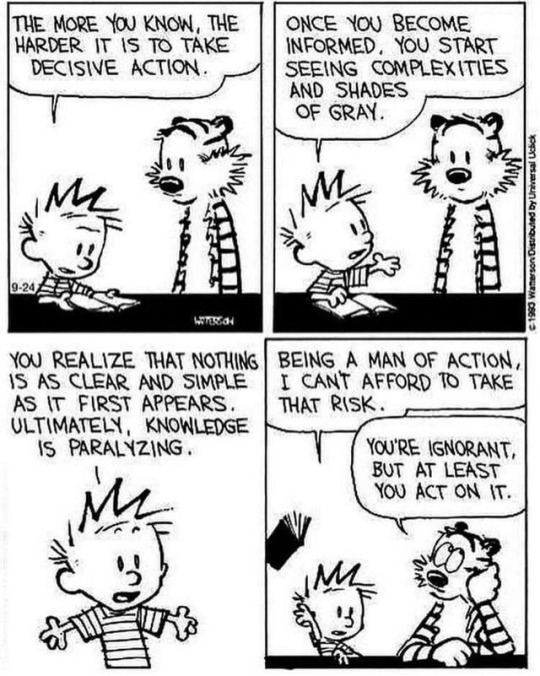
2 notes
·
View notes